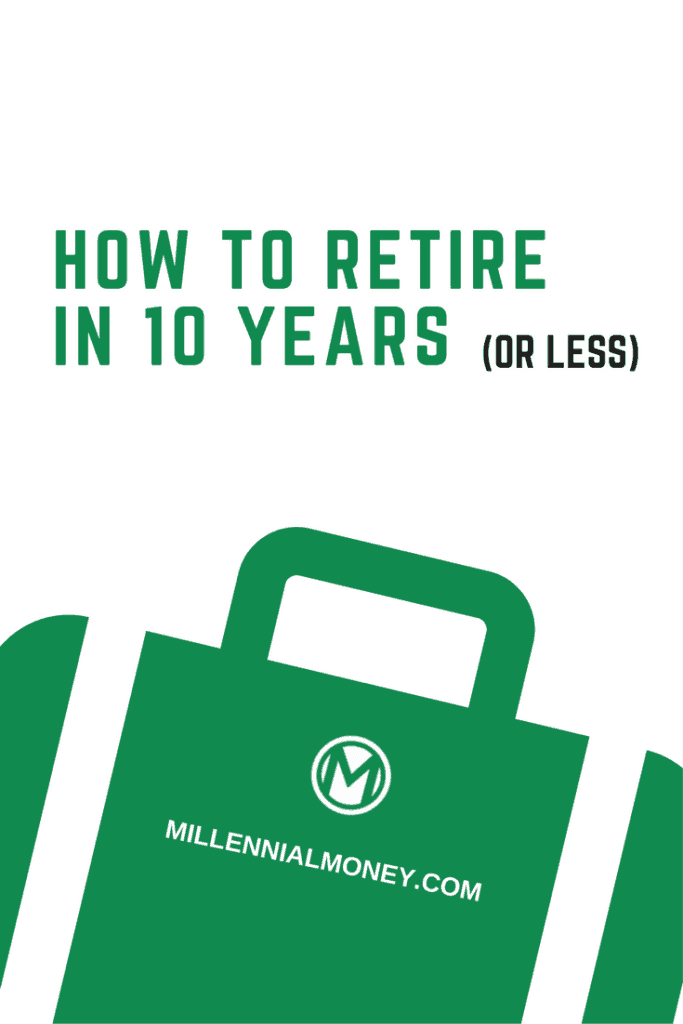Before we begin let me introduce myself so you know I haven’t just fallen off the turnip truck. I reached financial independence in my 40’s and eventually retired last year at 52.
My assets are arranged so that I’m living off the income they provide — not having to draw them down. So, in theory, they will last forever.
My 30-year march to retirement had its ups and downs. I made some great moves and missed others big-time.
With the benefit of hindsight, I’ll share what I consider to be the key steps to retiring as soon as possible — taking the best of what worked for me combined with what I wish I had done differently.

Afterward, I’ll give an example of how these steps can play out in the real world.
The ESI Scale
My site is called ESI Money because it focuses on the three areas that drive financial independence: earning, saving, and investing (ESI).
As you might imagine, the more you do of these three, the faster you’ll get to financial independence. But “do more” as guidance is a bit vague and doesn’t provide a clear path to retirement.
To reach early retirement you’ll need to get specific and determine what level of commitment you can make to each of the three steps, then make a plan to work on those.
There are many paths that can get you home, so consider where you can make headway and where you’d rather pull back a bit. The following steps in this post are ones I think give the best chance for quick success, but you’ll need to determine whether or not they fit your lifestyle.
Step 1: Create a retirement budget.
Before you climb a mountain, you size it up. The retirement equivalent of that is setting a post-retirement budget.
You need to know what you want to spend in retirement in order to understand what you’re shooting for. Once you do, you’re off to make it happen.
If you have a budget now (and the longer you’ve had one the better), setting an estimate should be easy. Developing my retirement budget was a breeze because I had over 20 years of spending data in Quicken. I knew exactly what our family required in every category. Yours will be equally simple if you’ve been keeping a budget for at least a few years.
If you haven’t, you’ll need to start from ground zero. You should develop a budget for the next year (we’ll use it more in a few steps) as well as draft an estimate of your retirement spending. The best sources for spending estimates will be bank and credit card statements.
Step 2: Work to grow your career
Here are two great pieces of news about your career:
- Your career is your largest asset and is literally worth millions of dollars
- There are proven actions you can take to make it worth millions more
No, I am not over-stating the value of your career. But I am emphasizing it because a career is the engine that drives the early retirement train.
There are seven steps that will grow your career and help you earn higher than average raises. The good news for you is that you can start these right away. It took me a couple decades to learn some of them and I was still able to earn over 8% annual raises during my 28-year career. Here’s how to get a raise. The younger you are, you’ll have a big head start on me and thus have the potential to perform much better.
Review the seven steps and develop a plan to put them into action. Your bank account will thank you.
Step 3: Scour your budget for savings
As your earnings grow, also look to increase the gap between earning and spending by regularly updating and reviewing your budget.
As you become more familiar with it and see how the money is flowing out, you’ll be able to identify steps to maximize your savings rate.
I recommend reviewing your budget and making adjustments monthly. This is what we did and it was quite effective.
By this process of regular review and changes, you’ll ensure your budget is efficient as possible.
Step 4: Begin investing immediately
As you create an ever-larger amount of savings (as your income grows and your expenses decrease), you’ll want to get that money working for you immediately.
When it comes to investing, time is your biggest asset. The more time invested, the more your savings will grow.
Begin investing immediately as it can make a huge difference. This is the area of my biggest financial mistake — I waited for five years after college to begin saving and investing and those five years are worth a fortune. So don’t waste them.
Investing can be difficult if you have a short time horizon, but as long as you have 10-15 years, I’d start investing with low cost, US stock-based index funds to maximize growth.
MM note: To learn more check out my investing strategy.
Get as much money as you can working as fast as you can and soon your money will be helping you achieve financial independence.
Step 5: Develop a side hustle
Having a side hustle can help your finances in a couple ways. First, having an extra income will allow you to earn more and thus save more in a shorter period of time.
Second, a side business in retirement will mean you’ll need to earn a lot less from your assets, speeding up your retirement date by many years.
There are many side hustles that can be started these days. I’ve made extra money as a freelance writer, blogger, and consultant. I’ve considered ideas like becoming a pet-sitter or developing my own product for sale.
Take some time and consider the options, then pick something you enjoy, has fair earning potential, and teaches you skills.
Step 6: Don’t accumulate debts
During this entire process, debt will be an absolute killer. Yes, you may already have some debt which will impact your numbers for sure, but don’t make it harder on yourself by adding more.
Drive used cars, try to live rent free, and don’t succumb to the constant urge for the latest and greatest gadget.
You are focusing on SAVING money with this plan, not SPENDING it haphazardly (i.e. spending so much that you have to borrow).
Of course, you’ll have money to spend and enjoy while you’re working on early retirement. But spend within your means and don’t go into debt or you’ll definitely delay your retirement date.
Step 7: Keep at it
Implement the above steps and stick with them. Time will take care of everything else.
Run your numbers at least once a year. Update your retirement spending (especially as you get more current living expenses) so the estimate of your needed retirement income becomes more and more refined.
Eventually, you’ll reach the point where your retirement income is higher than your expenses. At that point, you can retire from full-time work as detailed below.
Running the Numbers
To see how the steps above can play out, here is an illustration to consider.
Let’s begin with the following assumptions:
- You make $50,000 a year at your current job
- You need $40,000 in retirement to cover living expenses.
Here’s how to work the above situation to retire asap:
Begin by initially saving $20k per year and investing it immediately. That’s a 40% savings rate and is certainly healthy, but is just average among extreme early retirees. It’s completely do-able (and I speak from experience). Keep your standard of living low so you can invest more as you earn more.
And before someone says “it can’t be done in [insert name of city they currently live in]” let me say that you may need to move to make early retirement happen because where you live has a major cost impact on your budget.
Work at your job to get top raises. Follow the steps noted above and you should be able to earn 5% raises rather easily (this is on average — some years will only be 3% but some could be 10%). We’ll be conservative and say you earn 5% average raises and save all the increases.
So now you’ve set up a system where you are saving $20k every year plus every amount of income you receive over $50k.
Assuming your investments earn 8%, taking these steps alone will yield you almost $450k after ten years.
Add in Your Side Hustle
Here’s where you’ll see a great benefit from your side business. Let’s say you get that side hustle up and running in year one. In the first years, you’ll probably not earn much and anything you do earn will be plowed back into the business to help it grow.
Let’s say that by year three you are able to earn $4,000 a year (less than $100 a week) and after that add a couple thousand dollars a year to it. We’ll say you save all of this income too.
If you add the side hustle into the mix, after 10 years you’ll have over $550k saved/invested and a side business churning off $18k per year.
You are now ready to retire from full-time work. Here’s how:
- Using the 4% rule, you can withdraw $22k from your savings each year (4% of $550k).
- Add in the $18k from your business and you’re now able to generate $40k per year — you’ve covered your retirement spending needs.
BTW, if you don’t want to or can’t develop a side hustle, you could down-shift to a part-time job that earns you $18k per year. That shouldn’t be too hard for someone with the career skills you’ve developed over the past decade.
It Can Be Even Better
I used the numbers and results above because they represent a reasonable set of assumptions that could apply for many people. But these numbers can be improved significantly with just one or two extra pushes.
Consider the numbers above with the following changes:
1. You could earn $60k per year instead of $50k. Or maybe $70k or even higher.
2. You could save 50% of your income instead of 40%. Or maybe 60% or even higher.
3. It’s difficult to say you could earn a higher rate of return than 8% (especially given today’s market valuations), but what if you could earn 9% or even 10%?
4. Your side business could easily earn more than $18k per year. Even if you just earn $100 a week, that gets you to $5,200 as a start, well ahead of the $4,000 we suggested. And it’s likely it won’t take you three years to get to this level.
We assumed you have zero savings currently. If you have some, you already have a head start on your retirement nest egg.
These numbers are especially attainable for a couple who both work. As such, they could be looking at retirement well within a decade.
Wrapping It All Up
Of course, your exact circumstances will vary, but you can use the principles above to run your own personalized numbers.
Maybe you can earn more and save less. Or perhaps you’re better at saving than earning. Or maybe your side hustle can become a $30k per year business. Simply run the numbers with your particular likes and dislikes, see where that puts you on the road to retirement, and adjust as needed. We all take different paths, so don’t stress if you don’t do “as well” as others. It’s not a competition.
Now the retirement police may say “well you’re not really retired if you’re working part-time or on a side hustle.” First of all, who cares what others say? Second, if you want to be completely retired simply put more effort into the steps noted and save/invest more. Or take the steps as they are and add a bit more time. The plan can be as flexible as you want it to be.
And if it takes longer than ten years to retire, who cares? You’re still retiring in 15 to 20 years, well before most people (including me).




Read 20 comments or add your own
Read Comments